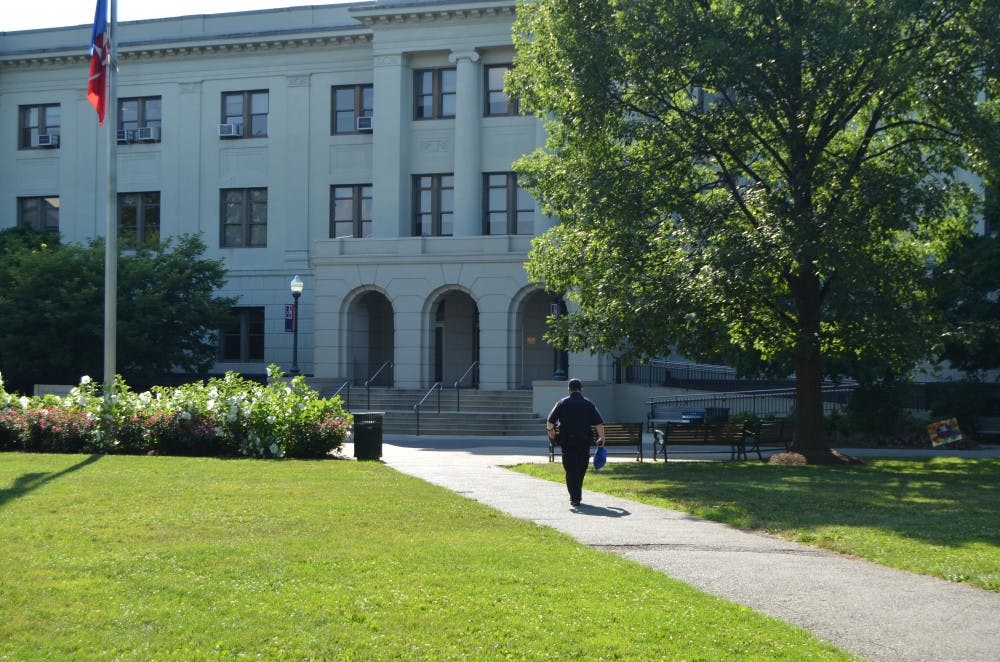After reports of an “armed intruder” near campus on July 18 led to a university-wide lockdown and complaints about the effectiveness of AU’s emergency alert system, administrators say they are now changing AU Alert protocols to send notifications to all current students “regardless of their registration status.”
Hundreds of students surveyed by The Eagle in July said they were “upset” and “concerned” that they received either a delayed alert or no alert at all from the American University Police Department about the lockdown. Following the incident, the University undertook a routine “after-action review” to assess AU’s emergency procedures and identify areas for improvement.
In a Thursday memo, Phil Morse, head of AUPD, and Dan Nichols, AU’s head of risk, safety and transportation programs, said the review showed they needed “to change AU Alert protocols regarding student notifications” after the lockdown.
“This incident revealed that attitudes and expectations regarding the receipt of texts have changed,” Morse and Nichols wrote. “Also, the current ebb and flow of students on campus no longer revolves around the various semesters.”
Now, all current students will receive AU Alerts. Once students are enrolled in the University and stay enrolled, their information will be entered into the AU Alert database, and they will receive alerts year-round until graduation or termination of enrollment, Morse and Nichols wrote.
Previously, alerts were only sent to students registered for classes on campus that semester, Morse and Nichols wrote. Because the incident took place in July, only students registered in summer courses received alerts, they added. (Through The Eagle’s July survey, some students who were not enrolled for the summer, or have graduated, reported receiving alerts).
“This protocol was put in place years ago and was intended to notify and give guidance to those who are most likely to be on campus and whose safety is most at risk,” Morse and Nichols wrote. “Also, considerations included the cost of receiving texts and the sense that unwanted or irrelevant texts would be unwelcome.”
However, if a student skips a semester and is not pre-registered for the following semester, they will not receive alerts and will need to re-register for alerts, they wrote. Additionally, after a year of this new protocol, the University will evaluate the effectiveness of the system, according to the memo.
Another source of concern for students, staff and faculty was the delayed email notifications sent out during the lockdown, which were the fault of a recent update to the alert system, according to the memo.
In addition, the University’s alert vendor, RAVE, has added security measures that inspect emails as they flow through their system, Morse and Nichols wrote. Because the AU Alert was sent to multiple invalid email addresses, RAVE’s security system “dramatically” slowed the email send rate, leading to delayed email notifications, they said.
“Rave engineers were immediately notified of the issue by our system monitors and made a change, modifying the offending protection rules to allow email to be delivered,” Morse and Nichols wrote. “In the future, any changes in the platform will be tested by Rave for quality assurance, to identify any adjustments prior to an actual incident.”
The memo also addressed how the University alerted people who weren’t AU students, faculty or staff about the armed intruder. Several students who responded to The Eagle’s survey expressed concern about how the lockdown was communicated across campus, particularly to staff and construction workers.
During the lockdown, AUPD officers were “able to advise those who were outside to follow alert guidelines,” Morse and Nichols wrote.
“We have a robust visitor registration system that allows those not automatically registered for AU Alerts – including vendors or contract workers, visitors and guests, conference and camp attendees, alums and parents – to register,” Morse and Nichols wrote. “We are working to make sure that onboarding and welcome information for these groups is regularly and consistently offered.”
In addition, “emergency quick reference guides” have been posted on campus to remind students, staff, faculty and guests about what to do in an emergency. In the next two weeks, the University will send reminders about active shooter training and other emergency resources, according to the memo.
“We encourage all in our community to recognize your important role in being prepared and informed,” Morse and Nichols wrote.




